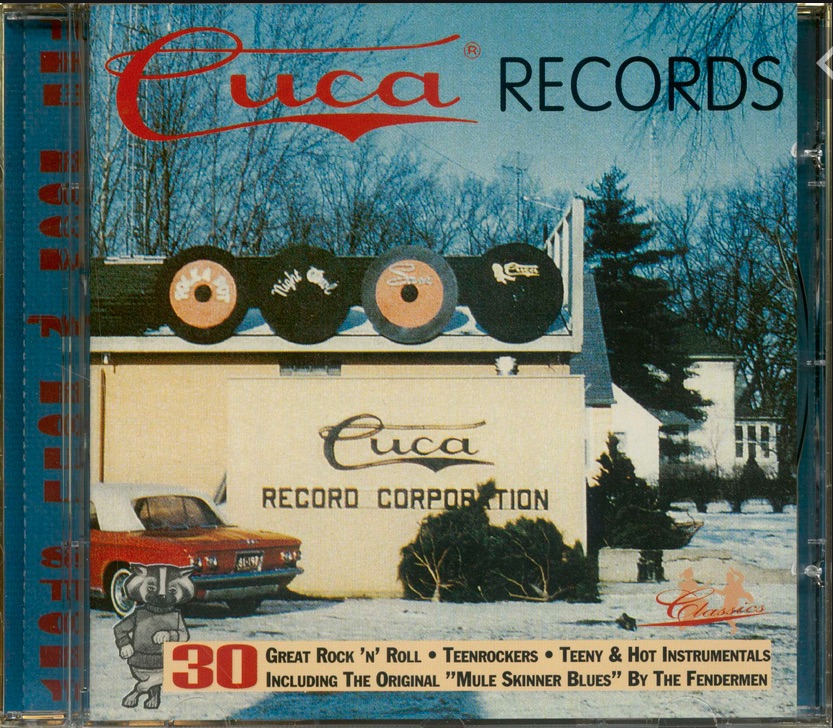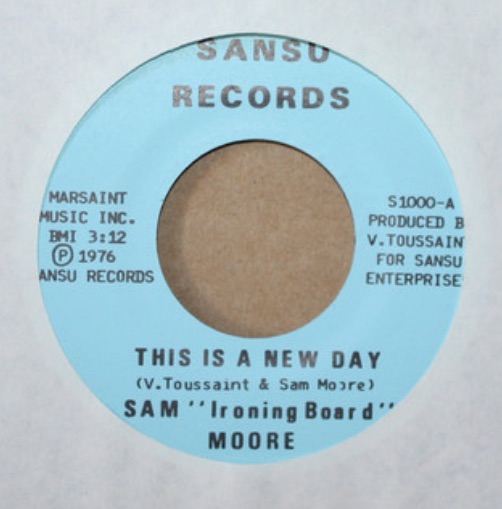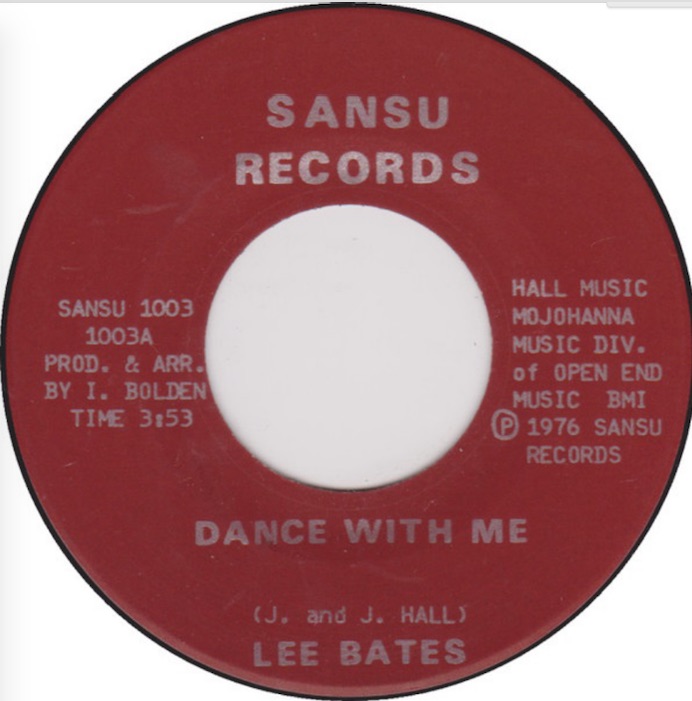-
Posts
4,417 -
Joined
-
Last visited
-
Days Won
39 -
Feedback
0%
Content Type
Forums
Event Guide
News & Articles
Source Guidelines and Help
Gallery
Videos Directory
Source Store
Everything posted by Robbk
-
I'm pretty sure I remember seeing the Italic versions first. So, they would have been earlier, and the first press runs would have been smaller runs, before they knew if they would sell. I remember hearing both "You Stood Me Up" and "Fool For Your Love" played on WVON. Both had some decent local sales. Even flip side "Everybody Say Yeah" got some plays. So there probably were second, larger press runs of 212 and 214. Which left a lot of boxes of them in distributorships like United and others, because they didn't do as well as had been expected. But, I don't remember "I Can't Find Another" getting played.
-
Maybe Merrill was McGregor alone, or him together with a financial backer, who withdrew out of the deal, and McGregor then brought in Jump Jackson instead, and they formed Heno Music for their new partnership?
-
I have 514, "Fool For Your Love"/"Baby You Need Me". I have the Italic group name version. I thought I had 515 "I Can't Find Another", as well, and have 512 ("You Stood Me Up"). So, I knew there were 3, I just forgot. Billy McGregor, and Jan Jones who sang lead were involved in Satch, as well as James Finch. I wonder who arranger "D.S." was? Satch's Heno Music seems to be one of Billy McGregor's publishers, as it is also with him on Fay and LaSalle Records, along with Jump Jackson. So, I'm guessing that Heno Music represented the partnership of McGregor and Jackson, because McGregor used different publishers on his other labels. We had a thread about Satch in 2013, with Bob A. The Yank, myself, and others on this thread, where we discussed all this.
-
I only knew The Jan Bradly on Night Owl, other than a lot of Hard Rock, Garage, and some Lily-White Pop. What is the name of the group and song on Night Owl, and Stax version group? I'd guess it was a White Group. Kirchstein seemed to have a policy of channeling black artists to Sara, other than Harvey Scales on Cuca, and Jan Bradly on Night Owl.
-
The Specials had 2 releases on Satch.
-
Your theory may be true for some or many of the cases. But, I can tell you from experience of being inside record companies, and having one of my own, that there often wasn't one, single person in charge of keeping track of assigning and assigned numbers, and even company statistical and non-financial records, and records were kept (or jotted down) on-the-fly, in a rush, and hap-hazardly by several different people, and the right hand didn't know what the left hand had done, and often it became too late to undo the error that finally had come to be discovered. Remember, that this was before the days of computers. People were scratching out records of what they did on any piece of paper they could find (sometimes including napkins (serviettes). Like Murphy's Law, they would almost always find out the error was made, just after the record would go to the pressing plant. And the people at the plant were busy, so they couldn't be contacted till after the first press run was finished.
-
Chicago.
-
I would guess that the SanSu group is a different group - NOT the Chicago group that was on Satch Records.
-
Yes, I see now that I probably should have started another, separate thread about Kirchstein's labels, and just posted on this one about The Specials on Sansu, given that the group on Sara is probably not the same group.
-
I've never seen a Specials' record on Sansu (no surprise, as it's from 1976). But I'm pretty sure I have a Specials' record from '61 or '62 on a dark green Sara Record, the colour of which looks like Sansu's. Sara was a subsidiary of James Kirchstein's Cuca Records, located in Sauk City, Wisconsin (southwest of Milwaukee). But, because of the 15 years difference in their timing, they most likely wouldn't be mistaken for each other, and most likely are not the same group. Of course, you all know that Cuca had mainly Caucasian Pop and Country artists other than Harvey Scales and The 7 Sounds. But, its subsidiary, Sara Records, had a fair amount of Milwaukee and Chicago late '50s and early '60s R&B (no mid or late '60s Soul of which I am aware, however). So, perhaps The Specials on Sara were from Chicago. Unfortunately, I'm stuck in L.A. away from most of my 45s, so I can't look it up. I didn't find The Specials on 45- Cat's Sara Records discography, and Global Dog doesn't have a San-Su discography. It is neither listed on 45 Cat's nor Discog's SanSu discography. But, both of those websites' discographies are very far from being complete. My Premiers' record on Sara is also not on those discographies. Interesting discovery: While googling for The specials on Sara, I found a photo of James Kirchstein's building complex, which housed Cuca's studio, and a record shop/music store, and a novelty/toy shop, at different times, and it had a logo for Cuca, Sara, AND NIGHT OWL RECORDS on the top of one side of the building!!!! So, now I know that in late 1963, when Don Talty and Jan Bradley wanted to release her Curtis Mayfield-written and co-produced "Behind The Curtains", after Chess refused to lease any more Mayfield-related productions, it WASN'T Mayfield-Talty-Bradley who owned that label, but, rather, Talty and Bradley went to Talty's old colleague, James Kirchstein to press it up. Talty was originally from Wisconsin (I'm pretty sure from Milwaukee), so the two of them must have crossed paths, because the music industry there was very small, and had very few people involved. I have since seen several other Night Owl records that I never saw while living in Chicagoland (which basically includes Wisconsin up to Milwaukee) while they were released. ALL of them were Hard Rock, Garage, Country and Rockabilly. I'm really surprised Kirchstein didn't release "Behind The Curtains" on Sara Records. But, maybe Jan saw The Night Owl logo, and wanted her record to have that cool-looking label. I've since been reading The Cuca Records' website, and now I've learned that Don Talty had Jan Bradley record ALL her cuts for Talty's Formal Records, including "Mama Didn't Lie" at Cuca's studio!!! The R&B producers (almost all from Chicago) who got their releases recorded and pressed by Cuca, went there because it was so far from big cities that almost no R&B producers knew about it. So, while recording there, no one could steal their songs. Here's a photo of Cuca's building, with the Cuca, Sara, Night Owl, and C&W label, Polka Dot Records' logos prominently shown. Also below are two different coloured Sansu label designs from 1976, one of which might have been used on The Specials' SanSu record.
-
Ha! Ha! I always thought it was a Native American name, like Chicago, Milwaukee, Muskegan, Potowotomi, Oshkosh, etc. ! We learn something new every day. Maybe if Trump loses the election, he'll actually decide to give up power to return to reality TV? I've watched it. It was well done, and it answered a few specific questions I had about how and why DeLuxe Records were bought out by King, and others.
-
Bad grammar and spelling! Side 1 #6 should read "Meine Jiddische Mama"- מין יידישע מאמע
-
It depends on your taste in music. I hated the pop-style and operatic music and songs Jackie got from Brunswick from the time Gordy left Jackie's team all the way until "Whispers". There were maybe 3-4 songs I liked that they gave Jackie during that period (which to me was wasted) - "Am I The Man" (and that was written by Al Hamilton, and given a Detroit arranged demo for Brunswick's New York Pop Orchestra to "copy"), and a few songs written by Detroit friends of Jackie's. Otherwise, for me, the whole period was wasted. I'm not saying that his Brunswick production with Carl Davis was no good, I bought it all and love it. Jackie may not have stayed with Motown past 1966 or so, anyway, and could have got together with Carl Davis, when he would have wanted to leave Motown anyway. But, Jackie was a Detroiter and early Berry Gordy friend, so he would have been treated as one of the best there from the start. I'm just saying I'd have liked to see him go to Motown in 1961, when his Brunswick contract was up, and stayed there until 1966, and then joined Carl Davis' gang - outside of Brunswick, as Mary Wells, Barrett Strong, and Sonny Sanders did. Jackie would have gotten good material all through 1961-65, and that era is more of my favourite sound than 1967-74. And maybe with less stress, he might have lived several more, or many more years.
-
By the way, my point was coming from the selfish point of view of a Jackie Wilson AND Motown fan. I personally would have preferred to hear Jackie sing songs written by Motown's best songwriting teams, and had The Funk Brothers and other Motown session players playing on his background tracks, and Motown arrangers arranging them, and Motown sound engineers working on his recordings in Motown's sound studios. I wasn't trying to imply that coming to Motown would have been better all-around for Jackie, personally. Although, I can't imagine being at Motown could have hurt him moire than being under Tarnopol's thumb. I can't believe that Tarnopol's horrible treatment of him didn't play a significant role in Jackie's all too early demise.
-
Why did Motown know what to do with The Supremes, Temptations, Four Tops, and Stevie Wonder, and they wouldn't have with Jackie? Or is it your contention that Motown ruined ALL their artists, and they'd have ruined Jackie more than Tarnopol did?
-
To Tlscapital: I was referring to El Corol's statement that he thought that Chuck Jackson wasn't a good fit at Motown (- e.g. that being a Motown artist didn't help Chuck's career). What does THAT have to do with Nat Tarnopol stealing Jackie Wilson's earnings? Are you saying that Berry Gordy and Motown were more unfair with Chuck Jackson related to what earnings he received than other record companies, for whom he could have recorded instead during that period, would have been to Chuck? And then, are you relating THAT to whether or not Jackie Wilson switching to Motown would have helped HIS career? I don't understand the logic of your statement, nor do I even understand whether you are talking about Chuck, or Jackie at which company, when you wrote "Worse than he did there and then... ?" Who is "he"? And what company is "there", and what period is "then". I'm sure that it is all clear in your own mind; but it is NOT at all clear to me (and, perhaps many other readers) in your vague and brief 7-word statement. Please clarify your statement with more detail, so I'll be able to understand your point, and why you have those emojies after it. This shows that typing messages (even with the aid of emojies) is a poor substitute for speaking face-to-face. Over the past several years, I've noticed that first, my short-term memory has been slowly, but increasingly melting away, and lately, even my long-term memory has started to leave. And, I often cannot bring up an English word when I need it in speech. But I hadn't noticed no longer being able to understand the printed word, in either Dutch OR English! This is distressing.
-
Chuck Jackson would have been fine at Motown if he had been treated the same as the Detroiters, given A-level material, and given a decent marketing push. The Isley Brothers, Brenda Holloway, and even Gladys Knight and The Pips were not treated nearly as well as the inner circle Detroiters.
-
Jackie would have done wonderful things coming to Motown in 1961, working with Smokey, HDH, Stevenson-Hunter, Fuqua-Bristol, singing in front of Funk Brothers' instrumentals! It was a crime against humanity! I was devastated in 1961 hearing the rumours that he'd be moving to Motown, and seeing over the years, that he never did.
-
I also seem to remember that New York's Beltone leased one other Chicago production during the 1962-63 period (I think it was a single artist), but I can't remember what it was, but I think it was one of the missing catalogue numbers on Global Dog's and SoulfulKindaMusic's label discographies.
-
Not only did New York's Beltone Records pick up Chicago's Dontels, but they also picked up The Opals' (Okeh female group) first record, "Two-Sided Love", a Maurice Rogers production.
-
Great article!
-
Only 14, eh? Time flies by quickly! Is Mel still alive? I haven't seen a post from him on ANY forum in maybe 14 years.
-

Songs That Use Same Arrangement /backing Track
Robbk replied to MrsWoodsrules's topic in Look At Your Box
Sorry for the misinformation, of course, Maurice Jackson owned Maurci Records, with Simmons and Chandler only working for him )despite rumours that Chandler was a part owner. -
The last I ever heard on it was that her vocal was not yet found. Does anyone know that it HAS been found???
-
Nice to see you back, Mel! Stay safe from The Virus. I love too many Blues songs to make a short list, and don't have time to make a long one. Now semi-retired, still writing and drawing a few comic book stories. But, stuck in L.A. because of The Virus. Haven't been back to Holland or Denmark for a whole year!







